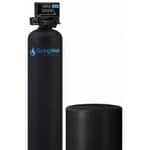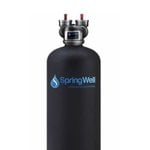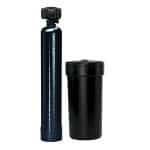You’ve seen our quick picks. Now we’ll walk through what sets each softener apart once it’s actually installed.
From ongoing upkeep to real-world water quality improvements, we focused on the stuff that matters day to day — not just specs on a box.
Some are dead simple. Others offer more control. Here’s how they compare when it comes to living with them, not just buying them.
In a rush?
SpringWell (pick #1) is our top pick for overall performance. For tighter budgets, #3 and #4 offer standout value without cutting corners.
Our Expert Picks:
- Salt-based: SpringWell SS1
- Salt-free: SpringWell Futuresoft Salt-free
- Well water: Whirlpool WHES40E
- Salt-based runner-up: SoftPro Elite
- Budget: fleck 5600 STX
- Electronic: Yarna Electronic Descaler
#1 SpringWell SS1 – Salt Based
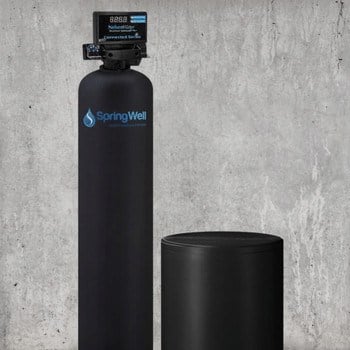
Why It’s #1 — Most softeners get the job done — eventually. SpringWell does it faster, cleaner, and without killing your water pressure.
It’s one of the few systems that combines smart regeneration, high flow, and mobile app control, making it feel modern without being needy.
You won’t be guessing when to refill salt or why your pressure dipped — because it just works.
One user said: “I don’t burn through bags of salt like I did with my old Whirlpool. This thing actually adjusts to how we use water.”
Features
- ✅ Learns your usage — regenerates only when needed
- 📱 App tracking — tweak settings or check flow from your phone
- 🛠️ Smart bypass valve — easy shutoff during maintenance
- 💧 No pressure loss — even with multiple showers running
- 🛡️ Lifetime warranty + 6-month trial — rare dual protection
💥 Get 5% Off! Use Code: QWL5
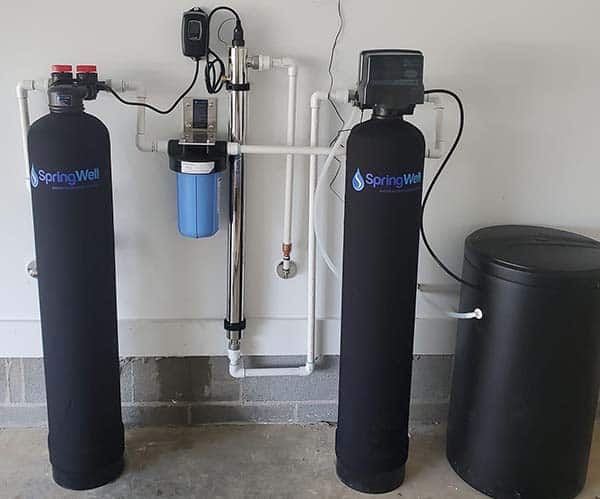
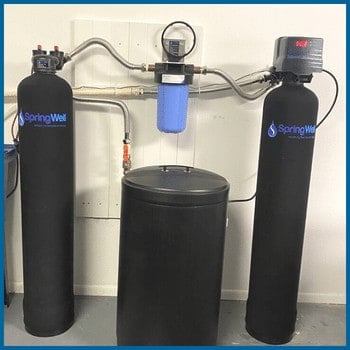
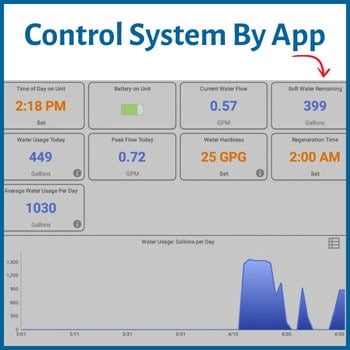
💡 Here’s the deal: If you’re constantly scrubbing limescale off your faucets or tired of soap that won’t lather, this system feels like a quiet upgrade to your whole house. You’ll notice it most in the shower and laundry — things just work better.
⚠️ Heads-up: If your area restricts salt-based systems, you’ll need to pivot to the salt-free version. It’s not quite as aggressive, but for most homes, it gets the job done.
✅ Pros
- 🧂 Salt refills last longer than expected — most users report topping off every few months, not constantly.
- 🛠️ Installs clean with a pro — no soldering nightmares or awkward re-routing if your plumbing is standard.
- 🔇 Surprisingly quiet — regeneration cycles barely make a sound, even overnight.
- 🧼 Laundry feels softer, and soap actually lathers — the change is noticeable within days.
- ♻️ Regenerates only when needed, saving salt and water — ideal if you’re mindful of waste or on a septic system.
❌ Cons
- 🔧 Doesn’t include reducer fittings — may need 1” to ¾” adapters
- 🧰 Not beginner-friendly — expect to hire a pro or prep ahead
- 📟 Control head feels dated — though the app handles most of the work
What buyers are saying
🆕 SpringWell SS1 Product Updates
- ✅ Now compatible with SpringWell’s UV Filter add-on — 15 GPM with 30 mJ/cm² protection
- 🧰 New bypass valve design (mid-2024) — easier shutoff, quicker install
- 📦 Updated packaging (late 2023) — fewer shipping issues, easier setup
- 📱 App v2.7 adds real-time salt level tracking + improved Bluetooth stability
Read Full Review: Springwell SS1 Review
#2 SoftPro Elite – Good Efficiency
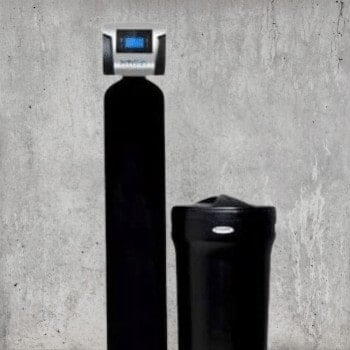
Why It’s #2 — SoftPro Elite skips the bells and whistles and nails the basics: strong softening, shorter cycles, and fewer salt top-offs.
It’s one of the most efficient units at this price — ideal for city water and budget-conscious homes.
One reviewer said they saw better pressure and water clarity within days of replacing their older softener.
Features
- ✅ Upflow regeneration stretches salt use — smart design, less waste
- 🧰 Includes quick-connect fittings — DIY installs are actually doable
- ♻️ Uses 75% less salt than many entry-level systems
- 🧠 Vacation mode + battery backup — keeps settings locked, even if power cuts
- 💲 Low annual cost with strong ROI — runs lean for the long haul
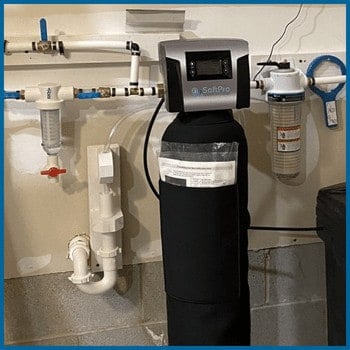
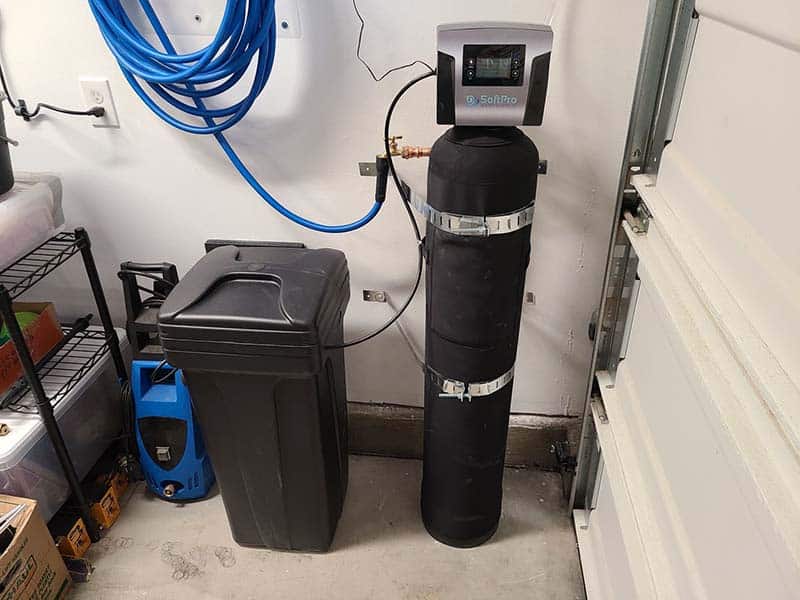
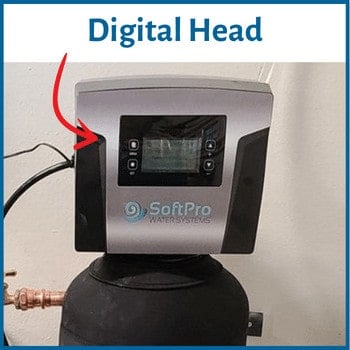
💡 Here’s the deal: If you’re tired of blowing through bags of salt or babysitting your softener, this system dials things in with upflow regeneration and short cycles. It’s a budget pick that feels like an upgrade.
⚠️ Heads-up: There’s no Bluetooth or smart tracking. If app control matters, SpringWell may be a better fit.
✅ Pros
- 💰 Uses up to 75% less salt than standard softeners — most owners say bags last twice as long
- ⚡ Fast recharge mode and vacation setting make it a low-hassle system year-round
- 🧠 Fully programmable head lets you fine-tune settings if you want more control
- 🧪 Great softening-to-salt ratio — especially for hard city water with moderate iron
- 🔧 DIY install is more approachable than most — quick-connect fittings save time and stress
❌ Cons
- 📱 No smart features — if you want app control or Bluetooth, look elsewhere
- 🔌 Needs a power source — plan ahead for outlet access during install
- 📖 Setup manual can be vague — some DIYers found themselves Googling mid-project
What other buyers have said:
🆕 SoftPro Elite Product Updates
- ✅ Quick-connect hoses now included — smoother DIY installs, no extra cost
- 📏 Upgraded to 1” ports — better water flow and compatibility with standard plumbing
- 🧠 New control head logic — easier regen programming and improved vacation mode
Read Full Review: SoftPro Elite Water Softener
#3 Fleck 5600 STX – Budget Friendly
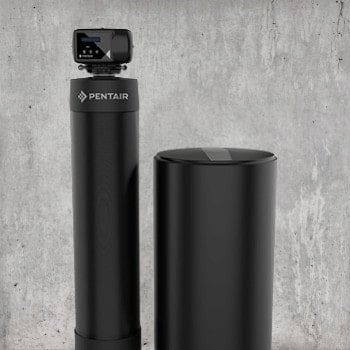
Why It’s #3 — The Fleck 5600 SXT isn’t flashy — but it’s tough, proven, and easy to live with. It skips the extras and just focuses on softening water reliably, year after year.
Its 10% cross-link resin holds up where cheaper units start to break down, and the simple digital controls get the job done without the learning curve.
One buyer put it best: “It’s not fancy, but it’s solid — and it just keeps going.”
Features
- 🔋 Internal battery keeps your settings safe during outages
- 💡 LCD screen is backlit for low-light checks — no flashlight needed
- 🛠️ Built-in memory auto-restores after power loss — no reprogramming
- 🧪 10% cross-link resin resists chlorine breakdown better than standard beads
- 📉 Demand-based metering helps conserve salt without constant tweaks
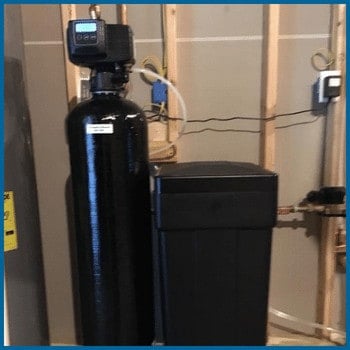
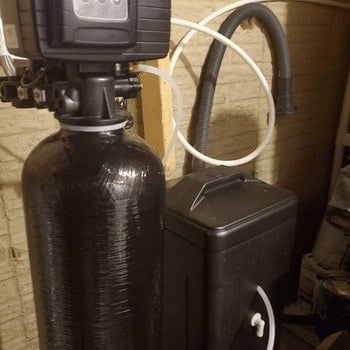
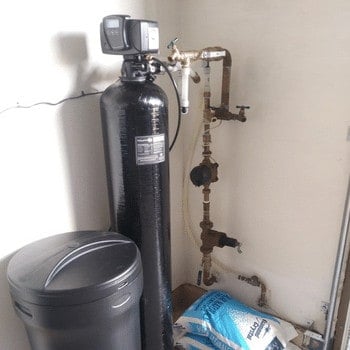
💡 Here’s the deal: The Fleck 5600 doesn’t have smart tech or sleek branding — but it makes up for it with rock-solid internals and a track record that spans decades. It’s the kind of system local installers recommend because it just doesn’t give you problems.
⚠️ Heads-up: There’s no app, no alerts, and no frills. You’ll need to program it manually and check salt levels the old-fashioned way — but if you’re good with that, it’s one of the most dependable options under $1,200.
✅ Pros
- ✅ Easy to troubleshoot — When something breaks, it’s usually a $20 part — not the whole system.
- 📚 DIY help everywhere — YouTube tutorials, forums, and plumbing pros all know the 5600SXT inside and out.
- ⏳ Longevity wins — Many users report it running strong after 10+ years with minimal maintenance.
- 🧩 Parts are interchangeable — You’re not locked into one brand for replacement valves, heads, or tanks.
- 🛠️ Old-school reliable — It skips smart tech, but that simplicity means fewer glitches and easier repairs.
❌ Cons
- 🔧 Clunky programming — The interface isn’t intuitive. Expect to keep the manual nearby during setup.
- 🚫 No salt-saving logic — It regenerates as programmed, even if your water use drops (wastes salt over time).
- 🎛️ Dated control head — It works, but looks and feels like tech from the early 2000s.
🆕 Fleck 5600SXT Product Updates
- ✅ Newer resin upgrades now available — Optional 10% crosslink resin holds up better under high chlorine loads (ask at checkout).
- 🧰 Valve head tweaks in late 2023 — Improved seals reduce leakage complaints and extend longevity.
- 📦 Streamlined packaging update — Now ships with better foam inserts to reduce transit damage (rolled out Q1 2024).
Read our Full Review: Fleck STX 5600 Water Softener Review
#4 Whirlpool WHES40E – Perfect For Well Water
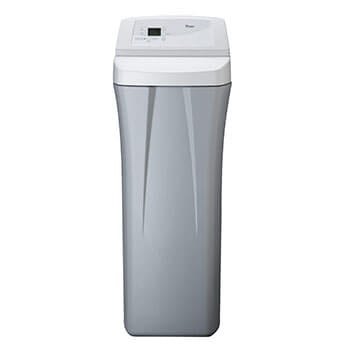
Why It’s #4 — The WHES40E wins on practicality. It’s one of the few sub-$800 systems that handles both hard water and low-level iron without extra filters or frills.
It may not wow with extras, but its NSF certification, salt-saving regen, and straightforward setup make it a workhorse for busy households on well water.
One buyer said they “haven’t seen orange stains in months — and the install took less than an afternoon.”
Highlights
- 🧠 Learns usage patterns to avoid unnecessary salt waste
- 🛠️ DIY-friendly valve head makes install easier than most big-box systems
- 🔄 Salt refill reminder light helps prevent lapses in performance
- 🚿 Water feels noticeably softer within days, especially in the shower
- 🔌 Built-in memory saves settings during power loss — no reprogramming
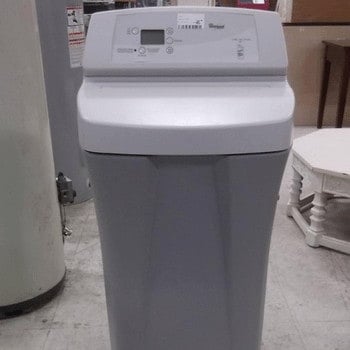
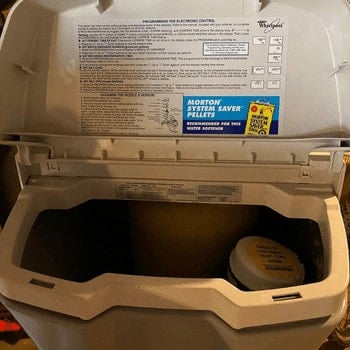
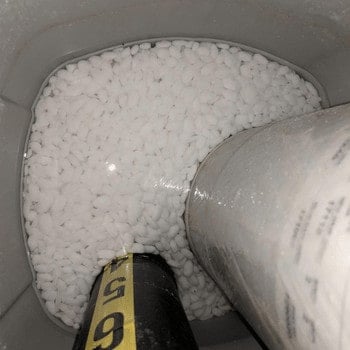
💡 Here’s the deal: This one’s for homeowners who want less thinking, more soft water. No fiddling with timers, no app to learn — just a reliable, plug-and-play setup that keeps up with everyday use.
⚠️ Heads-up: A few users mention the salt sensor can be finicky or delayed. If you’re the type who likes seeing everything at a glance, the lack of real-time alerts might feel like a step behind.
✅ Pros
- ✅ Saves salt without skimping on softness — Users say it holds its own even with hard well water and doesn’t burn through pellets.
- 🔕 Quiet during regeneration — No middle-of-the-night thuds or whines like some budget models.
- 📏 Compact build fits tighter utility spaces — Great for basements, crawl spaces, or small closets.
- 🚰 Noticeable boost in water clarity and taste — Especially in homes with mild iron or mineral issues.
- 🧰 DIY-friendly install for basic setups — Plenty of owners report getting it up and running without hiring help.
❌ Cons
- ❌ Iron filter isn’t bulletproof — Handles up to ~3 ppm well, but if your well water has higher iron levels, you’ll likely need a dedicated pre-filter.
- 🔧 Plastic fittings feel a bit flimsy — Several buyers recommend swapping them for brass upfront to avoid leaks.
- 📟 Control panel feels dated — It gets the job done, but don’t expect touchscreen or sleek design.
🆕 Whirlpool WHES40E Product Updates
- 🧾 No major updates reported since launch — but user feedback remains strong on performance and support.
Read Our Full Review: Whirlpool WHES40E Review
#5 SpringWell FutureSoft Salt-Free – Great For City Water
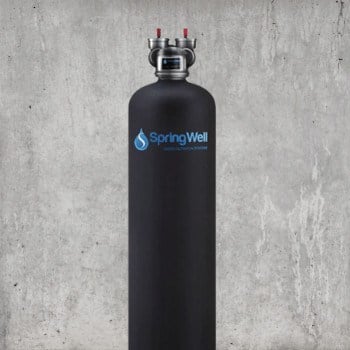
Why It’s #5 — If you want softer-feeling water without the salt, SpringWell’s FutureSoft delivers hassle-free scale protection that won’t mess with plumbing or pressure.
It’s not a true softener — minerals stay in your water — but users say scale on shower heads and glassware drops fast. It’s also dead quiet, zero-maintenance, ideal for city water.
One user put it best: “I wanted low effort and no salt bags. This nailed it.”
Features
- 🌿 No salt, no waste — zero brine discharge means it’s safer for septic and won’t pollute local waterways
- 💦 Preserves healthy minerals — still get calcium and magnesium without the scale
- ⚙️ Installs like a filter system — no need to rework your plumbing if you’ve swapped cartridges before
- 🔇 Runs silent 24/7 — no cycles, no timers, no interruptions
- 🔁 Backed by a full-year trial — return it risk-free if it doesn’t solve your scale issues
💥 Get 5% Off! Use Code: QWL5
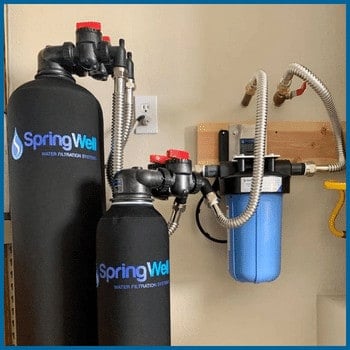
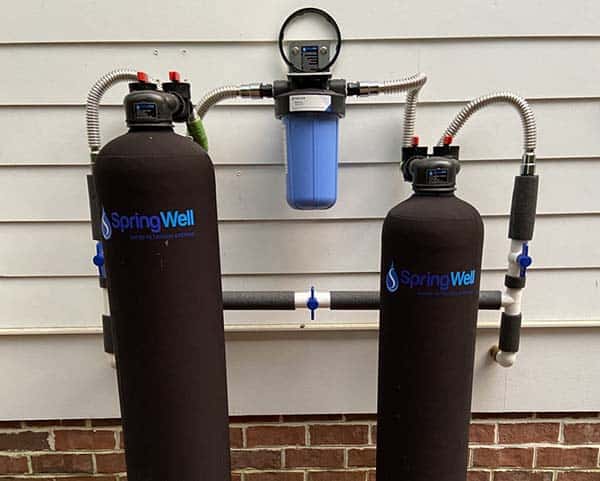
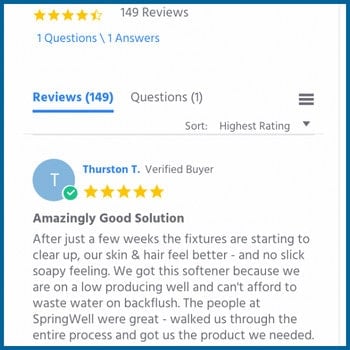
💡 Here’s the deal: If you’re on city water and want fewer chores, FutureSoft checks all the boxes. It cuts scale without needing electricity, salt, or complicated settings. One user said: “I installed it and basically forgot about it — until I noticed my shower doors weren’t crusty anymore.”
⚠️ Heads-up: If your water has iron, sulfur, or manganese (common in wells), this unit isn’t built to handle it. The media can foul quickly. Go with the SS1 instead — it’s more aggressive where it counts.
✅ Pros
- 🧼 No slime, no soap scum — users consistently report shinier sinks, cleaner glassware, and fewer water spots
- 🌱 Truly zero-waste — no salt bags, no electricity, and no drain line to mess with
- 🔕 You’ll forget it’s even there — ultra-quiet and maintenance-free once installed
- 🔩 No plumber needed — most buyers say it’s the easiest SpringWell system to install solo
- 💧 Great for sensitive skin — water feels noticeably softer without removing healthy minerals
❌ Cons
- 🧪 Doesn’t work with high iron or manganese — well water with over 0.3 ppm iron or 0.05 ppm manganese can ruin the media
- 💸 Upfront cost is steep — especially since it doesn’t technically “soften” water in the traditional sense
- 📦 Performance depends on flow — poor pressure or oversized plumbing can limit effectiveness in some homes
What other buyer’s have said:
Read Full Review: Springwell Futuresoft Salt-free Review
🆕 SpringWell FutureSoft Product Updates
- ✅ Now supports UV integration — pairs with SpringWell’s 15 GPM UV system (30 mJ/cm²) for enhanced protection against bacteria and viruses.
- 📦 2024 packaging redesign — sturdier interior padding minimizes transit damage, based on customer feedback.
- 🧰 Includes quick-connect install kit — updated fittings make setup easier right out of the box.
#6 Yarna Capacitive – Electronic Water Descaler
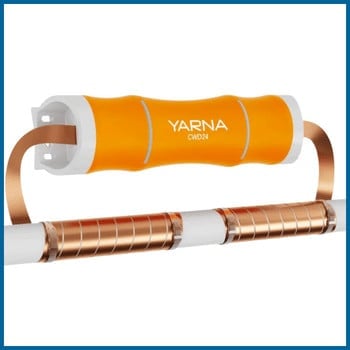
Why It’s #6 — The Yarna Descaler doesn’t soften water the traditional way, but it gets points for convenience. It reduces scale using electric pulses — no salt, no filters, and no plumbing headaches.
If you’re dealing with mild to moderate hardness and want something maintenance-free, it’s a clever workaround. One user summed it up best: “Didn’t expect much, but after a month, my dishwasher looks brand new.”
Features
- 🔌 Plug-and-go design — installs in under 10 minutes with no plumbing chops required
- 💧 No pressure drop — works alongside any existing softener or filter
- ♻️ Eco-friendly — no salt, chemicals, or waste discharge
- 📦 Tiny footprint — fits anywhere near a pipe and an outlet
- 🧰 Works with what you’ve got — no pipe modifications needed
💡 Here’s the deal: If you want less scale and zero maintenance, the Yarna gets out of your way and just does its job. Owners love that it installs with no tools and doesn’t mess with plumbing — a popular pick for rentals and older homes.
⚠️ Heads-up: It won’t soften water in the traditional sense. If you’re dealing with itchy skin, crunchy laundry, or extreme hardness, a salt-based system like the Fleck or SpringWell SS1 will do a better job.
✅ Pros
- ⚡ No plumbing skills needed — wraps around your pipe in minutes with no cutting, tools, or mess.
- 🏘️ Great for renters or older homes — doesn’t alter plumbing, and it’s easy to take with you if you move.
- 🌊 Works regardless of pipe type or flow rate — copper, PVC, PEX, or galvanized, high or low GPM — no problem.
- ♻️ Uses zero salt or water — a true “set it and forget it” solution that won’t touch your utility bills.
- 🧱 Noticeable difference on scale-prone surfaces — buyers often report less crust on faucets, showerheads, and tile.
❌ Cons
- 🔍 No mineral removal — it prevents buildup but doesn’t actually soften the water, which can leave some users underwhelmed.
- 🛁 Less effective on very hard water — if your water tests above 15 GPG, you may still see scale or feel film on skin and surfaces.
- ⚙️ Requires correct installation to work well — improper placement or loose winding can reduce results (follow the manual closely).
🆕 Yarna Capacitive Product Updates
- Now available in multiple configurations to fit pipe diameters from ⅜” up to 4” — making it compatible with both residential and light commercial setups.
Compare All 6 Water Softener Systems
(Mobile users: Swipe to scroll)

Compare Brands & Models |
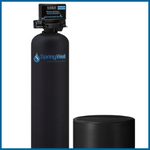
#1 SpringWell SS System |
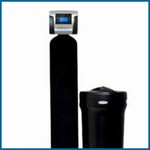
#2 SoftPro Elite System |
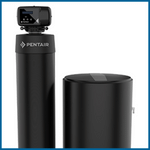
#3 Fleck 5600 STX System |
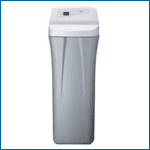
#4 Whirlpool WHES40E |
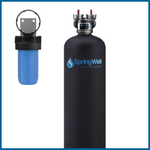
#5 SpringWell FutureSoft System |
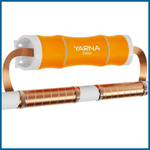
#6 Yarna Descaler System |
|---|---|---|---|---|---|---|
| Rating | 5/5 | 4.5/5 | 4.5/5 | 4.5/5 | 5/5 | 4.5/5 |
| Price | $$$ | $$$ | $$ | $$ | $$$ | $$ |
| Type |
ION Exchange | ION Exchange | ION Exchange | ION Exchange | TAC | Electric pulses |
| Capacity/Max Hardness |
32k, 48k and 80k | 32k – 110k | 32k – 110k | 40k | 81GPG | No limit |
| Regeneration | Metered | Metered | Metered | Metered | ❌ | ❌ |
| Flow Rate | 12-20 GPM | 15 GPM | 15 GPM | 15 GPM | 12-20 GPM | No limit |
| BlueTooth | ✔️ | ❌ | ❌ | ❌ | ✔️ | ❌ |
| Family Size | 6 | 6 | 5 | 6 | 6 | 4 |
| Warranty | Lifetime | 7 year | 5 years | 5 Year | Lifetime | 10 Years |
Still searching? These guides may fit your setup better:
- Water Softeners for Well Water – Built to handle iron, sulfur, and high hardness
- Salt-Free Water Conditioners – For homes where salt isn’t an option
💡How We Chose
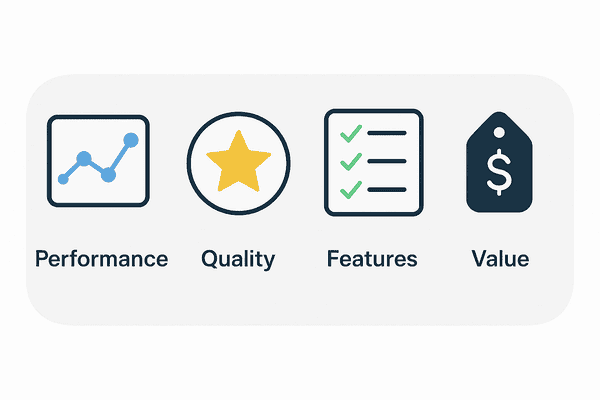
We looked beyond technical specs and focused on practical factors like: performance, maintenance needs, and long-term usability — using verified buyer feedback and third-party data to guide our picks.
| 📌 What We Looked At | ✅ Pros | ⚠️ Cons |
|---|---|---|
| Softening Capacity | Handles mild to very hard water | Not all systems list their max GPG |
| Efficiency | Upflow & metered models save salt/water | Timer-based systems can waste resources |
| Water Quality Impact | Removes or reduces scale, iron, minerals | Doesn’t remove other contaminants (e.g. chlorine) |
| Ease of Use | Bluetooth, app control, or simple setup | Some require routine maintenance or pro help |
| Long-Term Value | Solid warranties, real-user longevity reports | Budget models may need early replacement |
✅ Pro Tip: If your water softener becomes a chore, it’s probably the wrong one. Go for a model that fits your water type, household size, and available space — and works without constant tweaks.
🧭 Buyer’s Guide

Most people buy a water softener to fix white scale — but that’s just the surface. A properly matched system protects your home from inside out, improves how your water feels, and saves money long term.
The real value shows up in places you don’t always think to check:
| 🔎 Problem | ✅ Softener Solution |
|---|---|
| Mineral scale clogs appliances | Prevents buildup in water heaters, dishwashers, and pipes |
| Soap doesn’t lather or rinse clean | Improves water feel — less soap needed, better results |
| Laundry feels stiff or looks dull | Helps detergents work better, extends fabric life |
| Dry, itchy skin or flat hair after showering | Gentler on skin and hair, especially for sensitive users |
| High utility bills from overworked systems | Keeps water heaters and plumbing running efficiently |
💬 Good to know: The benefits sneak up on you. Most people notice better showers and fewer spots first — but the long-term savings on appliances and plumbing repairs are where softeners quietly earn their keep.
🧪 Test Your Water First
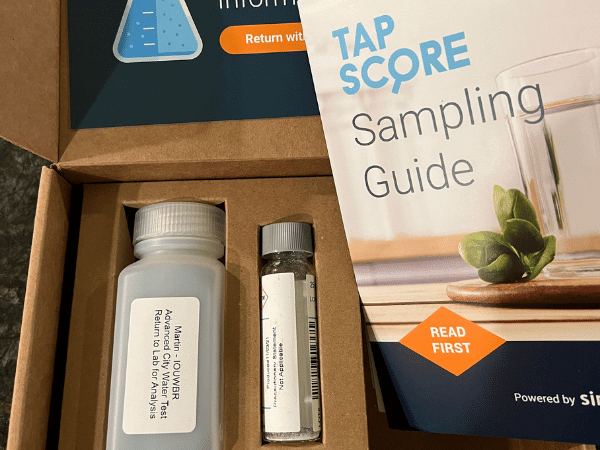
Before you invest in a water softener, it pays to know what’s in your water — and how bad the problem really is. Hardness isn’t always the only issue. Iron, chlorine, or even pH can mess with your setup if you’re not prepared.
| 🔬 Kit Type | 🛠️ Best For | 💵 Cost |
|---|---|---|
| DIY Strip Kits | Quick checks for hardness, pH, iron, and chlorine | $15–$30 |
| Digital Testers | More accurate GPG readings, especially for hardness | $40–$80 |
| Lab Mail-In Kits | Full panel testing (hardness, metals, bacteria, more) | $90–$200 |
💡 Good to know: A $20 test kit could save you hundreds by helping you choose the right system size and type. Don’t guess — test first.
🔍 Pro Tip: Know your hardness level in grains per gallon (GPG). Most softeners are rated by this — and buying too big or too small will cost you down the line.
💧 Types of Water Softeners
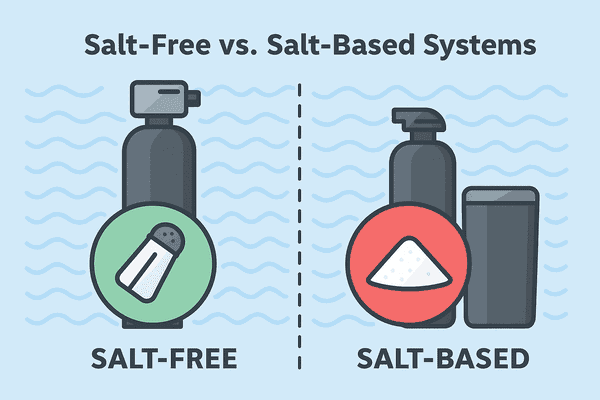
Not all softeners work the same way — and some aren’t softeners at all. Here’s how the main types break down and who they’re really for:
| 🔎 Type | ⚙️ How It Works | ✅ Best For |
|---|---|---|
| Salt-Based (Ion Exchange) | Swaps calcium & magnesium with sodium to remove hardness | High hardness levels, full softening, well or city water |
| Salt-Free (Conditioners) | Crystallizes minerals so they can’t stick to pipes or appliances | Moderate hardness, low-maintenance homes, eco-conscious setups |
| Electronic Descalers | Uses electric pulses to change mineral behavior, reducing scale | Light scale prevention, renters, small apartments |
📌 Pro Tip: If your water has iron or heavy sediment, salt-based is usually the way to go. But if you’re on city water and hate maintenance, salt-free may be all you need.
💡 Still deciding between salt-free and salt-based? We break down the pros, cons, and best use cases for each.
- 👉 Salt-Free vs. Salt-Based Water Softeners: What’s Right for You?
🌍 Environmental Impact
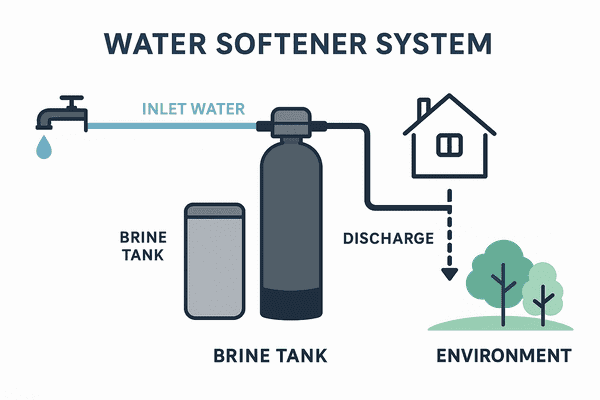
Water softeners can reduce scale, but they also affect your home’s resource use. If you’re trying to cut waste or go greener, here’s how different systems stack up:
Eco Considerations
- Salt discharge adds up – Salt-based softeners release sodium into local wastewater, which can stress treatment plants and harm soil over time.
- Water regeneration waste – Cheaper models may use 20–50 gallons per cycle. Demand-based systems cut that down dramatically.
- Energy footprint – Most softeners use very little electricity, but electronic descalers are by far the most efficient (typically under 5 watts).
- No-maintenance, no mess – Salt-free systems and descalers don’t need brine tanks or drain lines, which means fewer points of failure or contamination.
💡 Good to know: Some U.S. counties have banned traditional softeners due to brine discharge. Always check your local regulations before buying.
✅ Benefits & Drawbacks

Soft water has perks — but not every system fits every home. Here’s a quick breakdown of what to love and what to watch for:
| 🌟 Pros | ⚠️ Cons |
|---|---|
| Extends appliance life by reducing scale buildup | Higher upfront cost, especially for salt-based models |
| Soap lathers better — less needed, better skin & laundry | Salt-based systems require ongoing refills & maintenance |
| Can lower energy bills by improving water heater efficiency | Salt-free models don’t remove hardness, just reduce its effects |
📌 Good to Know: While softeners help with minerals, they don’t filter contaminants like chlorine or lead. Pairing one with a filter is your best bet for all-around water quality.
🧰 Thinking about installing it yourself? Most systems are easier than they look — if you avoid the usual pitfalls.
- 👉 Read our water softener installation tips to do it right the first time.
📝 Key Considerations
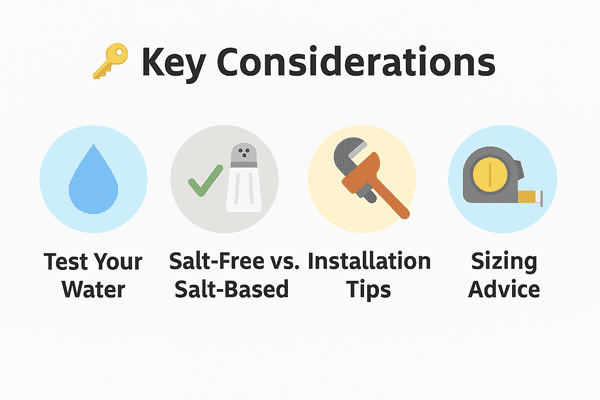
There’s no one-size-fits-all softener. The right pick depends on your water’s hardness, your household size, and how much effort you’re willing to put into upkeep. A little planning here saves a lot of regret later.
| 🔍 What to Look For | 💡 Why It Matters |
|---|---|
| Water Hardness Level | Knowing your grains per gallon (GPG) ensures you size your system correctly. |
| System Capacity | Bigger households or harder water = larger grain capacity needed. |
| Regeneration Method | Metered systems save salt and water by recharging only when needed. |
| Flow Rate | Match it to household demand — especially if you have multiple bathrooms. |
| Footprint & Install Room | Some units need more space (and power outlets) than others. |
| Local Codes or Salt Restrictions | Certain areas ban salt-based softeners — always check before buying. |
🔧 Pro Tip: Don’t overlook water pressure compatibility — if your home has older plumbing or low PSI, you’ll want a system that won’t throttle your flow.
🔍 Not sure what size you need? Oversizing wastes salt and money — undersizing won’t keep up.
- 👉 See our quick guide to sizing a water softener based on GPG and usage.
🛒 Before You Buy
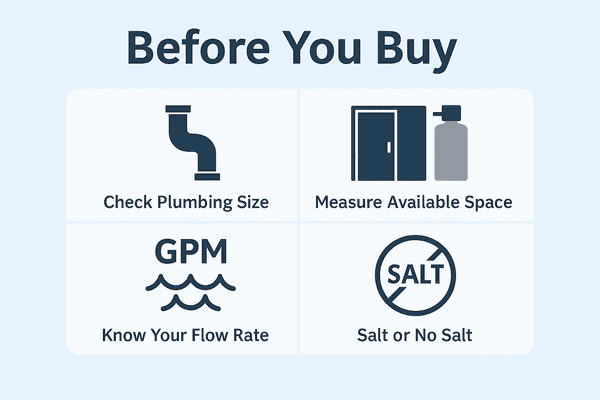
There’s more to softening water than picking a top-rated unit and clicking “add to cart.” These are the things seasoned homeowners wish they’d known upfront — and the kind of tips that can save you time, money, and frustration down the road.
- Double-check plumbing size: Most softeners ship with 1” fittings. If your home uses ¾” lines, budget for adapters or ask about upgrade kits.
- Measure your install space: A salt-based softener with a brine tank takes up more room than you’d expect — and tight utility closets can turn a simple job into a plumbing puzzle.
- Consider ongoing costs: Systems vary widely in how much salt and water they burn through. Some use 40–60% less with upflow or demand-based regeneration.
- Watch your flow rate: If your household regularly runs multiple showers or appliances at once, make sure your system supports high GPM. Undershooting here = pressure drops and angry housemates.
- Salt or no salt? Some cities restrict salt-based systems. If that’s the case, look into salt-free conditioners or electronic descalers to stay compliant.
💡 Pro Tip: Don’t just shop by price — match the system to your household’s water use, hardness level, and layout. A cheaper unit that struggles to keep up will cost more in the long run — in salt, maintenance, and regret.
💡 Smart Features & Tech Integration
Modern water softeners aren’t just mechanical systems—they’re becoming smarter, too. Here’s what to know if you want something that does more than just soften.
Features to Look For:
- Bluetooth or Wi-Fi connectivity Lets you monitor performance, track salt levels, and get alerts via your phone.
- Smart regeneration tracking Adjusts cycles based on real-time usage, not just timers.
- Diagnostic alerts Some systems notify you about low salt, leaks, or flow issues—reducing surprises.
- Remote shutoff options A few high-end systems let you bypass or shut down the system remotely, useful if you travel.
💬 Good to know: Many homeowners don’t use these features right away—but end up loving them later. Smart alerts can prevent maintenance headaches and give peace of mind when away from home.
🧰 Maintenance Tips for Long-Term Performance

Water softeners don’t ask for much — but a little attention goes a long way.
Here’s how to keep your system running smoothly for years:
- 🧂 Check Salt Levels Monthly: Make sure your brine tank isn’t running low — but don’t overfill it. Aim to keep salt about 2–3 inches above the water line.
- 🧼 Clean the Brine Tank Yearly: Flush out salt bridges, sludge, or residue that can interfere with performance. Use warm water and mild soap — avoid harsh chemicals.
- 🔄 Regen Test Every 3–6 Months: Manually trigger a regeneration cycle to confirm your system is still cycling correctly and not stuck in a loop.
- 🧪 Test Your Water Annually: Especially if you’re on well water. Shifts in hardness or iron levels can affect how your system performs — and what media it may need.
- 🛠️ Inspect Bypass Valve and Fittings: Look for signs of corrosion, leaks, or hardening O-rings — quick fixes now prevent bigger issues later.
💡 Pro Tip: If your water starts feeling “off” — like soap doesn’t lather or you see scale again — check salt levels and reg
Was This Page Helpful? Email us: [email protected]
❓ FAQs

Yes — especially if you’re on a sodium-restricted diet. It works similarly in regeneration cycles, though it’s slightly less efficient and often more expensive than regular salt.
Only if your household has high water usage or extremely hard water. Dual tanks ensure soft water is always available, even during regeneration.
If your water contains iron, clean the resin beads every 6–12 months. The brine tank should be cleaned about twice a year or whenever you notice buildup.
Most systems last 10–15 years. Lifespan depends on your water quality, maintenance habits, and system design.
Not by much. While salt-based models use water during regeneration, the overall impact is minor — and softer water can actually help you use less water in everyday tasks.
 123 people found this helpful. Was this guide helpful to you?
123 people found this helpful. Was this guide helpful to you? 
